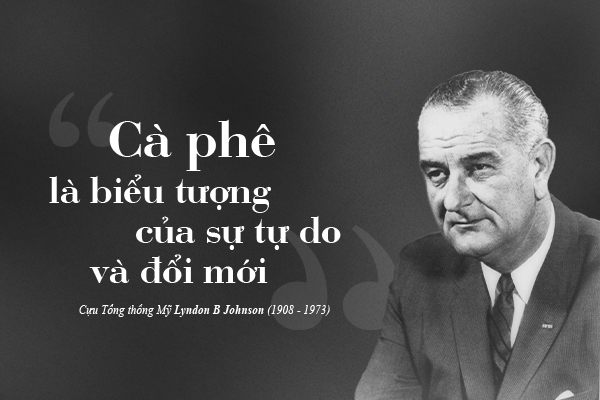
The Japanese have shaped Tea Ceremony into the national morality, an art of living conveyed through the enjoyment of a cup of tea. Meanwhile, Vietnam - one of the world's leading coffee powers, has the world's best Robusta coffee beans, has a long history of coffee appreciation culture for hundreds of years, but until now, the value of Vietnamese coffee is still in the low segment, mainly exported raw and has not been properly shaped as the inherent position of the industry and the country.
With the desire to bring the Vietnamese coffee industry to a new level, to enhance the value of coffee not only as a regular drink but also at the level of cultural coffee, artistic coffee, spiritual coffee... to philosophical coffee, worthy of the position of the world's coffee powerhouse - Trung Nguyen Legend Group has spent time and passion for many years to research the history, culture, art... of coffee in all areas of human life so that coffee becomes "Philosophical Coffee".
Throughout the journey of creation and development of Trung Nguyen Legend, the spirit of dedication to serving the community has always been the core throughout many action programs to create great aspirations and great directions for the country; to build a new position for the Vietnamese coffee industry on the world coffee map and on this Journey, Trung Nguyen Legend wishes to join hands with national policymakers so that Vietnam will soon become a powerful country and have comprehensive influence on the world!
The Japanese did it!
We Vietnamese can do it too and do it better !
Revolutionizing piano performance and creativity
Romanticism in music spanned from the early 19th century to the early 20th century, and was a period characterized by highly complex, personal music with an emphasis on emotional expression. During this period, Frédéric Chopin (1810 - 1849) was one of the most prominent composers, the first to explore the depth and complexity of emotion through piano works. His style of composing and performing piano broke with traditional keyboard playing, distinguished by its lyricism and unique approach to harmony, emphasis on single notes and large variations in tempo. Frédéric Chopin's creativity contributed to the peak of early Romantic music and helped make the piano the most popular instrument of the 19th century.
Frédéric Chopin was born in Warsaw (Poland), was exposed to the piano from a young age and began professional training at the age of 6. He quickly revealed his extraordinary musical talent and was compared to the musical prodigy Wolfgang Amadeus Mozart (1756 - 1791). His first composition at the age of 7 was the Polonaise, one of the familiar folk dances of the Polish people.
In the following years, Frédéric Chopin focused on studying, creating and performing music. Unlike most composers of his time, Frédéric Chopin mainly wrote solo piano pieces rather than symphonies or operas. Despite his young age, with his constant efforts and skillful piano composition techniques , Frédéric Chopin established himself with groundbreaking compositions, including variations on a theme of the opera Don Giovanni , Nocturne in E minor , Op.72 No. 1 , Polonaise in D minor , Op.71 No. 1 …
In particular, as a lover of creativity and experimentation, Frédéric Chopin's music constantly broke the previous musical composition conventions and added new forms to the world's classical music treasure. He created a new musical genre called Ballade, and adapted some genres such as Nocturnes, Scherzos, Études, Prelude... to create new musical effects. Before Frédéric Chopin, the Étude genre was originally exercises for artists to practice techniques on the piano, but with his adaptation, Étude became genuine musical works.
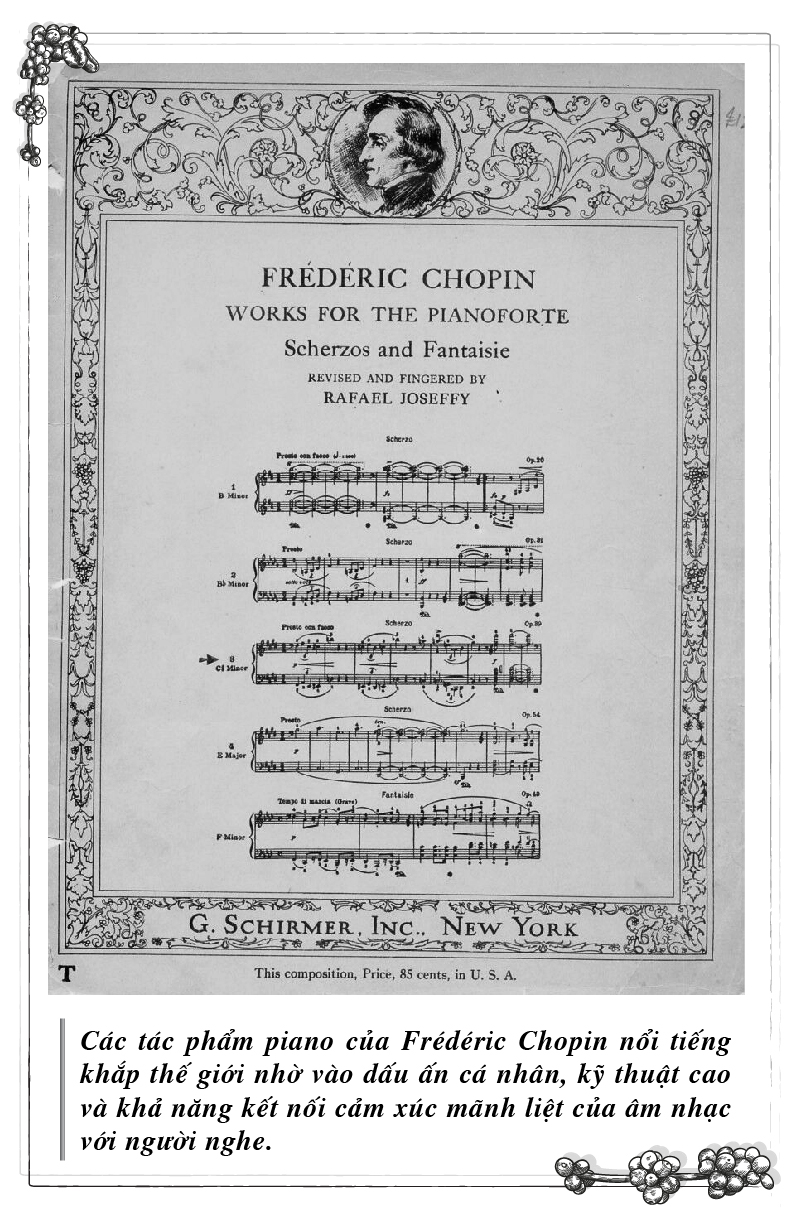
Not only does he have the ability to compose, Frédéric Chopin has outstanding performance techniques. Overcoming the one-way sound disadvantage of the piano, with his skillful technique, Frédéric Chopin expresses different levels of emotions, each note is full of energy and has the ability to evoke stories with many states from spiritual happiness to existential disorder...
At the same time, Frédéric Chopin frequently improvised new rhythms and structures in concerts. From there, he discovered new musical ideas and different piano playing techniques. Frédéric Chopin's innovations in fingering, pedaling and general treatment of the keyboard took his music beyond the traditional piano style, creating an important milestone in the history of the piano. Above all, his works have become standards for this instrument.
Frédéric Chopin's timeless creativity in style, musical form, and harmony greatly influenced composers during and after the Romantic period: Franz Liszt (1811 - 1886), Achille Claude Debussy (1862 - 1918), Gabriel Urbain Fauré (1845 - 1924), Richard Georg Strauss (1864 - 1949)... To this day, his music is still widely used in performances as well as professional music training around the world.
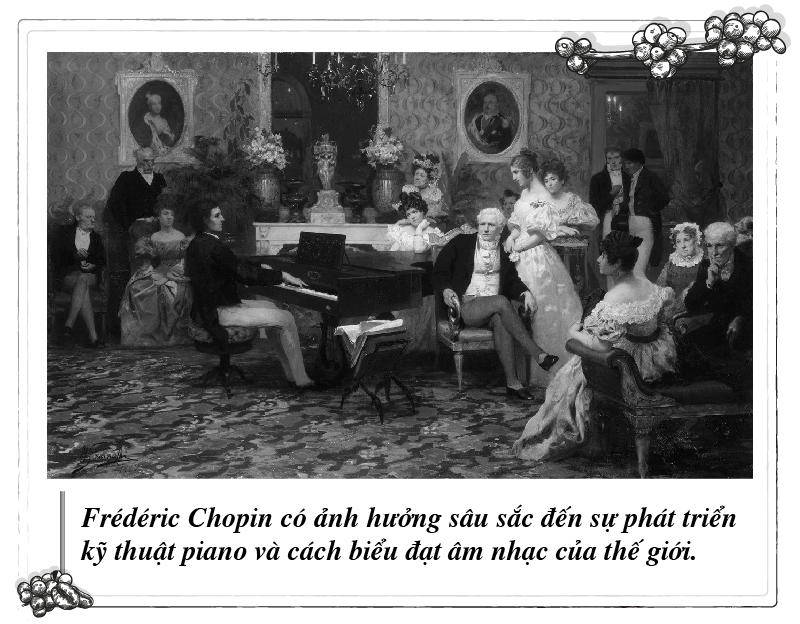
Symbols of nationalism in music
The Romantic period was marked by a nationalistic musical trend. Composers attempted to convey sounds that represented the homeland, national traditions, and themes of national liberation. As one of the first composers to incorporate elements of national music into his piano works, Frédéric Chopin transformed traditional Polish folk melodies into one of the most iconic works of musical nationalism.
As a student at the Warsaw Conservatory, Frédéric Chopin and his friends went on vacations and performances throughout Poland. During these trips, he came into direct contact with the folk music of the Polish Plains and developed a strong interest in it. Frédéric Chopin was determined to explore and study Polish folk music and traditions more deeply than any composer before him.
In particular, Polish coffee shops were a familiar destination for Frédéric Chopin in his research on Polish folk music and traditions. He often visited coffee shops in the Miodowa, Kozia and Krakowskie Przedmiescie areas to meet friends with similar interests, discuss the culture and traditions of his country and update the latest news and criticisms of music and theater.
As a space that vividly reflects the social life of the Polish people, and is a center for discussing cultural, political and artistic issues, coffee shops such as Honoratka, Pani Brzezińska, Pod Kopciuszkiem, Dziurka and Wiejska Kawa… became Frédéric Chopin’s favorite space. This was where conversations, observations and knowledge exchanges took place, helping Frédéric Chopin absorb a large amount of knowledge about the culture and traditions of his homeland Poland, contributing to shaping his musical career.
Combining harmony and Polish folk dances such as Mazurek, Kujawiak, Polonaise, Oberek… into his piano works, Frédéric Chopin created a unique style in his music. From here, traditional folk music genres were popularized in concert halls and marked their mark on the European music map.
At the same time, acorn coffee, a traditional Polish drink, was a favorite of Frédéric Chopin. Mixed with spices, cloves and honey, acorn coffee is considered a special source of energy that promotes creativity, dynamism and awareness for Frédéric Chopin to become a great composer, as well as to fight during the serious illness at the end of his life.
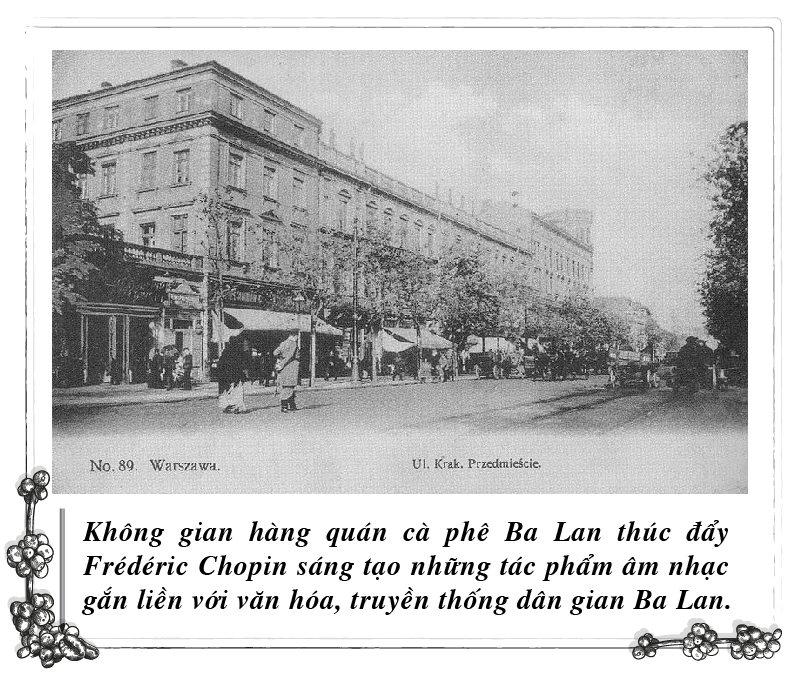
Influenced by political events, in 1831, Frédéric Chopin and most of the elite emigrated to France. Living in exile further deepened Frédéric Chopin's feelings for his homeland and fueled his desire to honor and preserve the country's cultural heritage through music.
Always concerned about his homeland, Frédéric Chopin used Polish folk music and skillful piano techniques to compose works expressing the will, national spirit and multi-dimensional emotions of the Polish people, from the tragic pain of oppression to the heroic spirit of fighting for freedom. Typical works include Fantasy on Polish Airs or Revolution Étude .
The expression of deep emotion and strong nationalism, has helped his compositions become symbols of Polish national identity and pride, and made Frédéric Chopin the leading representative of nationalism in the history of world music. The national spirit in Frédéric Chopin's music was so strong that during World War II, the Nazis banned the performance of his Polonaises in Poland, fearing the national symbolism hidden in the work.
During his time living in France, Frédéric Chopin always maintained his love for traditional Polish cuisine, especially acorn coffee. He also regularly participated in activities to meet friends and famous people, eat, chat and exchange music at cafes such as Cafe de Foy, Cafe Tortoni...
Frédéric Chopin's open personality and excellent music helped him find many opportunities to show his talent and gain fame in France. He also received praise from figures in the Paris art world such as composer Robert Schumann (1810 - 1856), Giacomo Meyerbeer (1791 - 1864), Hector Berlioz (1803 - 1869) ... In the 20th and 21st centuries, Frédéric Chopin's works have always been admired and have been the subject of many films, books, photos and biographies from many different historical perspectives.
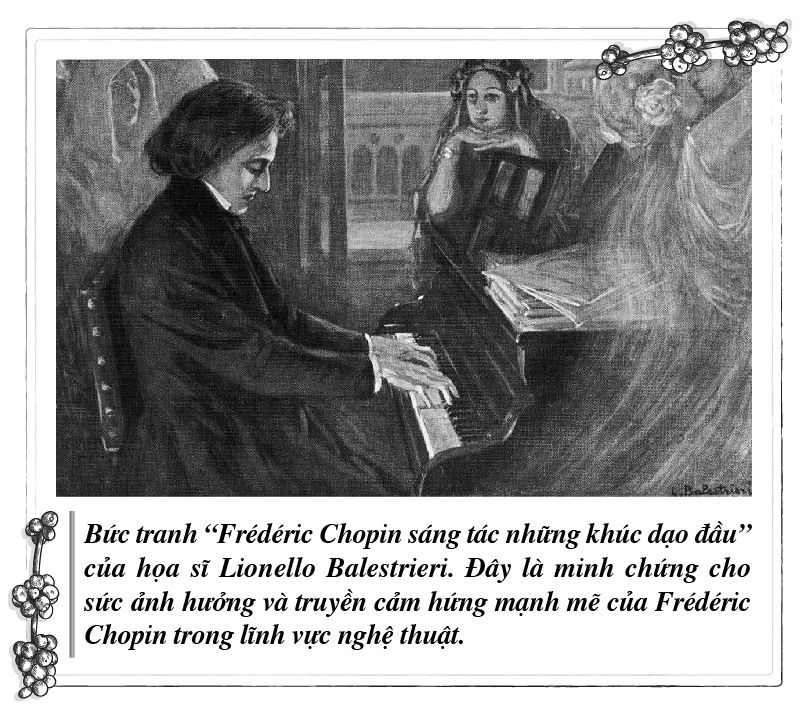
Despite his short life, Frédéric Chopin made great contributions to the history of world music, from mastering the expression of emotional depth, innovating musical genres, revolutionizing piano techniques, to being a folk icon and national pride of the Polish people. In particular, in the process of Frédéric Chopin's extraordinary musical creation, coffee and coffee shops contributed to promoting creative thinking and shaping Frédéric Chopin's unique musical style, thereby bringing Romantic music to its peak, building lasting musical standards.
[embed]https://www.youtube.com/watch?v=qN-xnmhGaRA[/embed]
We invite readers to watch the series of videos of Philosophical Coffee posted on the channel https://bit.ly/caphetrietdao
Read the next part: Coffee and the formation of special terms
Source: https://thanhnien.vn/ky-104-frederic-chopin-va-tien-trinh-sang-tao-am-nhac-vuot-thoi-dai-185240618094447089.htm




![[Photo] Prime Minister Pham Minh Chinh chairs the first meeting of the Central Steering Committee on housing policy and real estate market](https://vphoto.vietnam.vn/thumb/1200x675/vietnam/resource/IMAGE/2025/9/22/c0f42b88c6284975b4bcfcf5b17656e7)























![[Photo] General Secretary To Lam presents the First Class Labor Medal to the Vietnam National Energy and Industry Group](https://vphoto.vietnam.vn/thumb/1200x675/vietnam/resource/IMAGE/2025/9/21/0ad2d50e1c274a55a3736500c5f262e5)
































































Comment (0)